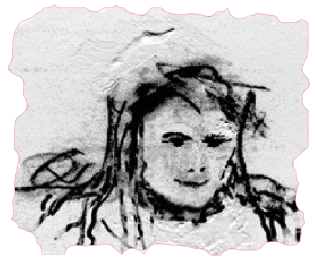Excerpt from The Great Book of Bob, ©2009
The Waitress and the Poem
I had spent most of a sun-bleached day traveling in a listless caravan of geezer-driven RVs and looky-loo sedans traversing southern mountains in search of deciduous October splendor.
Don’t you just hate it when a vision crumbles? Naive lad that I am, I had supposed I’d be the only human braving the heights of the Great Smoky Mountains in the peak of leaf season—alone with the moist shush of tires turning serpentine mountain highways, the windows wide to the loam-scented brace of autumn airs, the drear and weighty mystery of low hanging clouds, the piercing intensity of sunlight burning ghostly columns through gray-cast day to ignite precious parcels of Earth’s glorious palette. But, to my dismay, hundreds of other seekers had shared the same notion. I couldn’t even find a parking space at the overlooks and trailheads. So much for communing with the gaudy-lush death, the moribund brilliance of Appalachian October. By the time I exited the western portal of the National Park and cruised into the congested commerce of Gatlinburg, I was one road-fatigued vagabond seemingly lost from the intended purpose of his journey. But, who was I, or for that matter,who are any of us to assume we grasp the mandate of a day’s travel until after the miles are spent and we settle into a dimly lit corner of Night’s Inn and reflect upon our deeds?
I’ll never know her name or the warm and willing touch of her flesh, the rich depths of her good laughter, the sounds of her sleep, the lilt of her songs, the sorrow of her weeping. I’ll never see her again but her eyes and the gentle dazzle of her furtive smile are immortal in the coffers of my heart and libido. I did not wantonly crave her. My motives were as pure and honest as involuntary chemistry and soulful compassion.
I just felt a vast longing to help her.
I don’t recall what I said that made her laugh. But she gave me a flash of smile and a quickly suppressed spill of giggle. She covered her mouth with her hand and glanced guiltily at the corpulent matron who roosted behind the front counter of the restaurant feigning friendly smiles and shrilly spitting orders at the peons who were damned to her service.
My lovely waitress cowered at the paint-peeling banter between the fat lady at the register and her sister, an equally rotund harpy stationed back at the food window spurring the cooks and the wait staff with disdain and insult.
So damned loud and harsh and cold were the proprietors of the tablecloth and doily, double-forked and teatime-proper eatery. But then, in dulcet dialect transcending cacophony, she spoke to me.
And, as the mountain child said, “Would y’all care for coffee, sir?” I sensed her life’s story. There was a ring on her left hand. There was a gentle, abiding patience about her and an enduring sense of peace and strength in her graceful movements. She was at once plain and sensuous. And she had the gift of listening eyes and there was a hint, a secret of a lust-lovely smile just beyond a thin veil of fear and decency. How I hated that she cowered.
A few years earlier I had written a sad poem about a waitress in an all-night diner. (It’s in my book, Adventures in the High Wind.)
from Night Diner
(the all-night Waffle House)
Last night I visited a graveyard.
Out on the old highway--
settled in the clutter of ancient tourist courts,
cluttered garages, junk yards,
and poor people--
there was a place of death.
